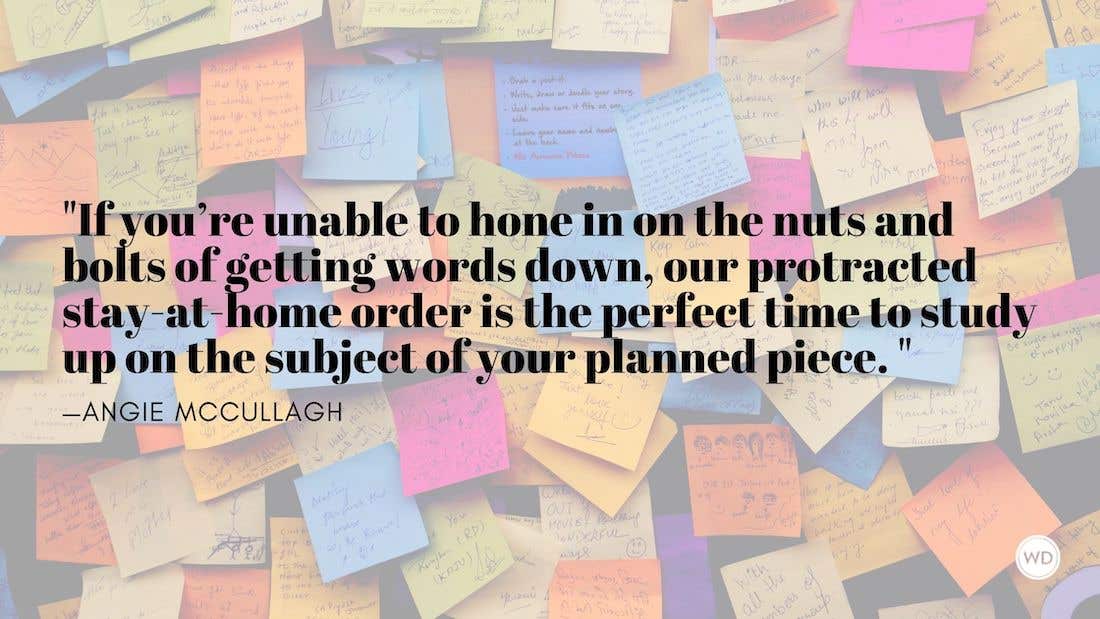3 Steps For Overcoming Writer’s Block
This writing tip addresses overcoming writer’s block and is excerpted from You Don’t Have to Be Famous by Steve Zousmer. Being stuck at the start creates a special kind of…
This writing tip addresses overcoming writer's block and is excerpted from You Don't Have to Be Famous by Steve Zousmer.
Being stuck at the start creates a special kind of frustration. Before you can even get going, you are tangled in knots, immobilized, virtually paralyzed. Your skills and bright ideas desert you like rats realizing they’re about to go to sea on a leaky ship. Suddenly you cannot write a single respectable sentence or sustain the simplest chain of thought. Then it gets worse.
After a very short dose of this, you’re ready to throw up your hands and quit. Many writing projects grind to a halt before the end of the third paragraph. The third paragraph often has a Bermuda Triangle effect—you go into it but never come out. And of course many writing projects don’t even make it to the first sentence, as the writer wilts under the pressure and cannot get down even those first few words.
Welcome to writer’s block.
I think of writer’s block as a drooling, grinning monster that lurks at the starting line, waiting to pounce on unwary writers who either have no starting idea (the plan is to babble aimlessly until something develops) or an undisciplined excess of ideas (which behave like the proverbial army of cats: unmanageable and scampering off in every direction).
Here’s what I advise. If you’re bogged down at the beginning and feel the fangs of writer’s block digging into you, take decisive emergency action, starting with defensive moves.
How to Beat Writer's Block
First, retreat. Break this bad spell. Don’t sit there letting frustration boil over. Get up, shake it off, and go away for a while. Come back later when your mind is cleared and you’re ready to try again.
Second, delete everything that’s been contaminated by the writer’s block virus. You’ll recognize the difference between a start that’s just not very good yet and a writer’s block start that is so convoluted and hopeless that it seems to be pulling you down in quicksand. These bad starts are lethal and have to be gotten rid of, even if you invested long hours or days working on them. Don’t try to salvage anything from them, or you’ll risk salvaging the problems that caused them.
Third, make a rule that until you get past this struggling phase, you will only write short sentences. Short sentences force you to deal in clear ideas. They force you to be concrete instead of abstract. It is hard to get lost in short sentences.
Some writers insist that writer’s block does not exist. They think this, I suspect, because they are the lucky ones who have never been abandoned by their ability to do the single thing you must do to beat writer’s block: Blast over the starting line without hesitation and drive hard through a few decent pages before stopping for air.
The way to outsmart writer’s block is to begin with sure-thing momentum and get past the start so fast that it cannot get you in its clutches. You were vulnerable to writer’s block because you were not ready. Now, be ready with a specific plan for the first pages.
Pick something you know you can write without bogging down. It can be an anecdote, an image, a scene, a memory, a moment, a description, a joke, a declaration—anything that gets you moving. Before long, probably without realizing it, your writing muscles will loosen, the sun will come out, you’ll relax into a natural writing rhythm, and there will be no more danger of becoming road kill for writer’s block. You’ll be
on your way to the relatively safe and straightforward territory of the middle.








